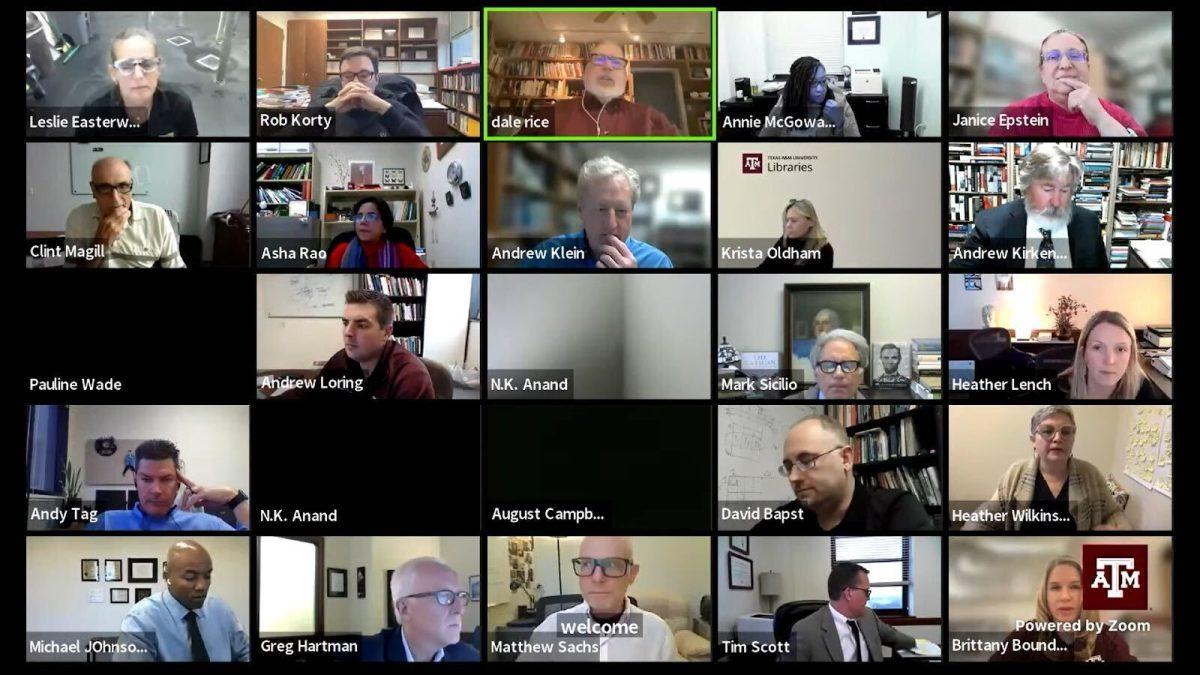Monday’s Texas A&M Faculty Senate meeting was joined by A&M President M. Katherine Banks, Ph.D., and other members of university leadership, who fielded questions from faculty senators regarding campus renovations, online education, study abroad programs and more.
An unnamed faculty senator asked via Zoom chat what Banks’ plan for renovating campus infrastructure was. The senator cited failing elevators, among other concerns.
“There is a question in the chat, and it has to do with deferred maintenance,” geography professor Andrew Klein, Ph.D., said on behalf of the senator. “It has to do with elevators that are going out and stuck … long lines.”
Banks said that $22 million dollars had already been dedicated to campus maintenance, but acknowledged the funding wasn’t sufficient. Banks said she is looking to add an additional $8 million to the renovation budget.
“Right now we spend approximately $22 million dollars a year for deferred maintenance across campus,” Banks said. “We have determined that we need more money than that — in fact, we need a great deal more — but the amount of money we are able to contribute in addition to the $22 million is an additional $8 million dollars.”
Professor of engineering technology Jorge Alvarado, Ph.D., asked about Banks’ position on online master’s degree programs being offered by the university.
“Many departments in the university offer online masters, but on the other hand, many departments don’t,” Alvarado said. “So, what is your vision when it comes to online education?”
Banks said while the decision to implement online degree programs was up to individual departments, her office supported departments that chose to offer online programs.
“It really depends on the school or the college to come forth with these ideas,” Banks said. “We’re here to support. If you have a market, or an interest, and the faculty have a desire to teach online, then I think we should think about it.”
Another unnamed senator said, via chat staff, that turnover within their department was an issue and asked what steps A&M was taking to improve retention.
“Staff turnover continues to be a challenge,” Klein read on behalf of the senator. “Is there something that can be done that can help alleviate this situation where we see frequent turnover in staff?”
Banks said making A&M a place staff members can work at for their whole careers — rather than a stepping stone — by offering professional development services is the centerpiece of the administration’s strategy to retain staff.
“The whole process of professional development will be very unique in a university setting,” Banks said. “We want to see Texas A&M as a place where someone can spend their entire career, not just a job for two to three years.”
Professor of journalism and Faculty Senate speaker Dale Rice said peer universities had raised faculty pay to combat inflation, and questioned why A&M had not done the same.
“We see many of our peer institutions, and many of those in the SEC, raising base salaries higher than A&M was able to do,” Rice said. “I’m wondering to what degree you are concerned about faculty [and staff salaries] falling behind in a period of high inflation compared to our peer institutions.”
Banks suggested the peer universities mentioned by Rice raised faculty salaries by increasing tuition, and said A&M had to consider student affordability before raising faculty salaries.
“I would ask that you look at those universities that have had a high increase in salaries and determine if they had an increase in tuition as well,” Banks said. “As you all know, we did not have an increase in tuition last year … We must consider affordability.”
Other questions that Banks received included whether faculty members should be able to serve as academic advisors, how A&M can raise its ranking among national universities, how leadership would ensure niche and underfunded departments wouldn’t be punished for small class sizes and how departments can retain staff members without raising salaries. Banks delegated responsibility for these issues to the concerned colleges.
“It’s really up to each college or dean to determine how their unit can excel,” Banks said. “Maybe even down to the departmental level.”









